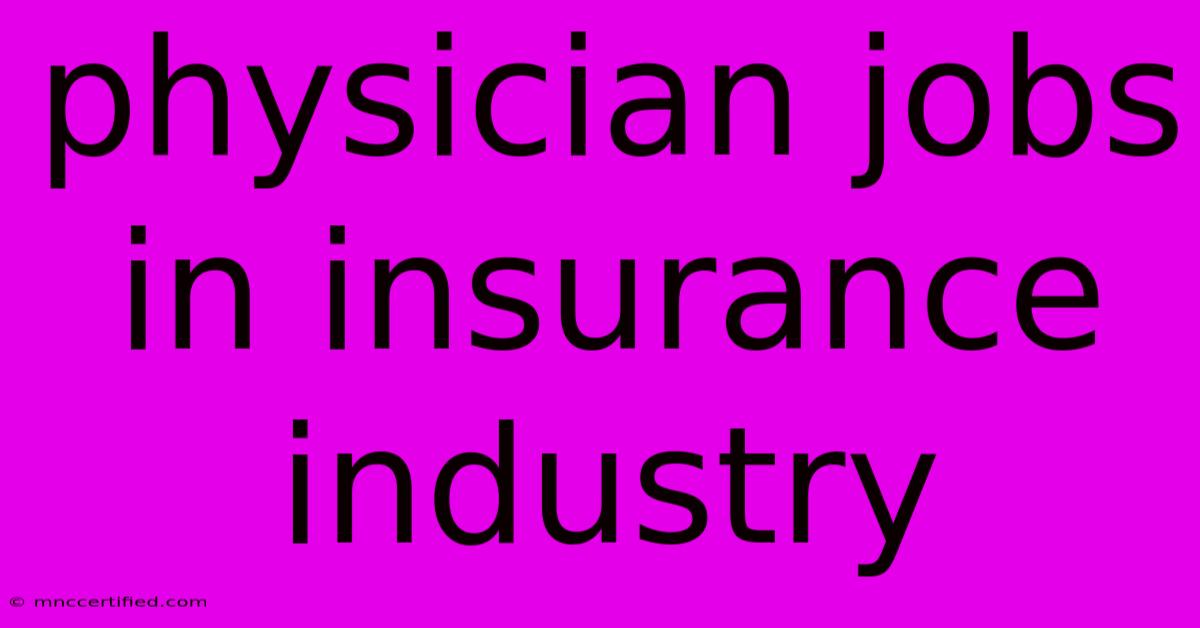Physician Jobs In Insurance Industry

Table of Contents
Navigating the Path: Physician Jobs in the Insurance Industry
The healthcare landscape is constantly evolving, and physicians are increasingly finding opportunities outside of traditional clinical settings. One growing field attracting medical professionals is the insurance industry. This shift represents a unique blend of medical expertise and business acumen, offering physicians a distinct career path with diverse roles and responsibilities.
The Rise of Physician Roles in Insurance
The insurance industry is seeking qualified physicians to:
- Improve healthcare quality and efficiency: Physicians bring valuable insights into clinical practices, treatment protocols, and cost-effective care delivery. This expertise can be leveraged to design effective insurance plans, manage risk, and ensure patient well-being.
- Reduce healthcare costs: By understanding medical needs and treatment options, physicians can play a critical role in developing cost-containment strategies, negotiating provider contracts, and implementing innovative care models.
- Enhance risk assessment and underwriting: Physicians with expertise in specific medical specialties can contribute to accurate risk assessment and underwriting processes, ensuring that insurance policies appropriately reflect individual health profiles.
- Promote preventative care and wellness programs: Physicians can spearhead the development and implementation of programs that focus on disease prevention, health education, and promoting healthy lifestyle choices, ultimately reducing healthcare costs and improving population health.
Exploring Physician Job Opportunities in Insurance
The insurance industry offers a range of opportunities for physicians across various areas:
1. Medical Director: This role encompasses a wide range of responsibilities, including:
- Overseeing clinical operations: Establishing and maintaining clinical guidelines, ensuring compliance with regulatory standards, and reviewing patient care records.
- Developing healthcare programs and strategies: Designing and implementing programs that address specific medical needs and promote efficient healthcare delivery.
- Managing provider networks: Negotiating contracts with healthcare providers, ensuring quality of care, and managing network performance.
- Risk assessment and underwriting: Evaluating patient health profiles and providing expert medical advice to support insurance risk assessment and underwriting decisions.
2. Medical Reviewer: Medical reviewers play a crucial role in evaluating the medical necessity of healthcare services and procedures. They:
- Review medical records and documentation: Analyzing patient records, including diagnoses, treatment plans, and medical procedures.
- Apply medical knowledge to assess appropriateness of care: Evaluating the medical necessity of services based on clinical guidelines and evidence-based medicine.
- Collaborate with other professionals: Working closely with claims adjusters, case managers, and other stakeholders to ensure appropriate and efficient healthcare delivery.
3. Healthcare Consultant: Healthcare consultants provide expertise and advice to insurance companies on various healthcare-related matters. This might involve:
- Developing healthcare strategies: Offering recommendations on healthcare program design, risk management strategies, and cost-containment measures.
- Conducting market research: Analyzing healthcare trends, evaluating provider networks, and identifying opportunities for improvement.
- Implementing new technology: Assessing and recommending the adoption of new healthcare technologies to enhance efficiency and patient care.
4. Claims Examiner: Claims examiners play a vital role in assessing and processing health insurance claims. They:
- Review medical documentation: Analyzing medical records, diagnosis codes, and treatment descriptions to determine the validity of claims.
- Apply clinical knowledge: Evaluating medical claims using clinical guidelines and medical expertise to ensure accurate claim adjudication.
- Investigate potential fraud: Identifying and investigating suspicious claims to prevent fraudulent activities.
Transitioning Your Career to the Insurance Industry
If you're a physician considering a career transition to the insurance industry, here are some steps to take:
- Gain industry knowledge: Research various insurance companies and their healthcare programs, understand the different roles available, and explore potential career paths.
- Develop relevant skills: Enhance your business acumen by pursuing courses in healthcare administration, risk management, or insurance principles.
- Network with industry professionals: Attend industry conferences, connect with professionals on LinkedIn, and seek mentorship from experienced individuals in the insurance sector.
- Consider an MBA or MPH: A master's degree in business administration (MBA) or public health (MPH) can provide valuable skills and knowledge for a successful career in the insurance industry.
The insurance industry presents a dynamic and rewarding career path for physicians who are seeking to leverage their medical expertise in a different setting. By understanding the available opportunities, developing relevant skills, and making strategic career choices, physicians can effectively navigate this evolving landscape and contribute to a more efficient and patient-centered healthcare system.

Thank you for visiting our website wich cover about Physician Jobs In Insurance Industry. We hope the information provided has been useful to you. Feel free to contact us if you have any questions or need further assistance. See you next time and dont miss to bookmark.
Featured Posts
-
Donovan Insurance Minot North Dakota
Nov 11, 2024
-
Primeira Liga Predictions Benfica Vs Porto
Nov 11, 2024
-
Confirmed Chelsea Starting Xi Vs Arsenal
Nov 11, 2024
-
Bosa Returns Active For Week 10 Game
Nov 11, 2024
-
Functional Medicine Doctor Insurance
Nov 11, 2024